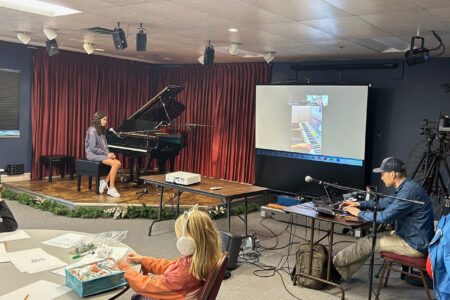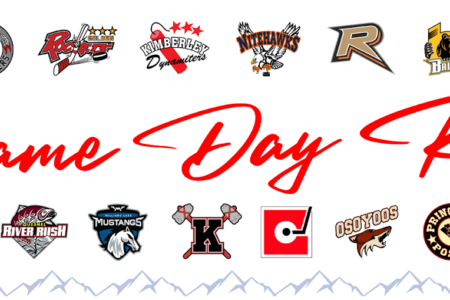TALES AND LEGENDS OF THE MOUNTAIN KINGDOM: Rossland’s Great Hockey Rivalry
Ah, hockey – Canada’s national game. And with hockey, as with many competitive sports, comes something else: great rivalries. You know, Montreal and Boston, Montreal and Toronto, provincial rivals Edmonton and Calgary. And then there are the lesser known rivalries from days gone by that were just as contentious in their time, one of which involved two of the Kootenays’ premier towns, Nelson and Rossland.
Both had hockey teams and both played each other during the winter on a regular basis, but it was Rossland’s annual Winter Carnival where some of the biggest hockey dramas Occurred. It’s almost like the carnival was a trigger point for controversy involving the two cities’ hockey teams, and at the centre of it all was a Rossland lawyer with a thriving law practice in both the Mountain KinGdom and Trail, and who was also the main referee at the Winter Carnival’s preeminent event, the senior men’s hockey tournament.
And by preeminent event, I mean really preeminent. When the carnival first started in 1897, skiing was the big draw, but it was eventually eclipsed by the carnival’s senior men’s hockey tournament, which was held in an outdoor rink it shared with other ice sports, like women’s hockey, junior men’s hockey, ice skating, etc. As the tournament grew, which it did steadily, ice time became an issue and it was decided to expand the carnival by one day so that the hockey tournament could be properly accommodated.
Nelson and Rossland had been rivals for a while before the Winter Carnival. The first record of a hockey tournament of any kind in the Kootenays was in February, 1896, so we can assume that the rivalry was established pretty quickly as the first hockey game on record in the area was the month before, between Nelson and Kaslo. Contributing to the hockey rivalry, as Ron Shearer puts it in his work “Fragments: Essays on Neglected Aspects of Rossland’s History”, Nelson and Rossland had a kind of “my town is better than your town” attitude towards each other. “Nelson, a mining and smelting town that was considerably older, contested Rossland’s pretensions of being the leading city in the Kootenays” he says on page 17. (Incidentally, Trail didn’t have a team until a few years after the carnival’s tournament started.)
There are few stand-out incidents between the two teams that illustrate to us exactly how intense the rivalry was, and both involved E.S.H. Winn, the well-known lawyer mentioned earlier. Winn had been appointed referee by the carnival committee for both the incidents.
In 1906, Nelson and Rossland faced each other for the carnival’s championship game. It was a rough game, played without modern day safety equipment. For starters, two Rossland goals were disallowed by the goal judge who hailed from Nelson, provoking loud arguments from the Rossland side, who claimed at least one of the goals was legitimate. Winn began to make questionable calls, or non-calls more accurately.
At the end of the second half (the games were played in halves, not thirds as they are now), the score was tied at 2 – 2. Before the overtime period started, the game had to be suspended twice because a Rossland player had to have a head injury stitched up. When overtime got underway, it lasted for an hour, and both teams were exhausted. It was 11:30pm. Winn decided to call the game to a halt – but not before nearly causing a brawl over some of his non-calls. He allegedly allowed a lot of Rossland players to feign injury or fatigue whenever the play got close to the Rossland net, and apparently he just winked at them and smilingly let the play go on. But the teams did agree to another game in the end, this one determining the carnival’s champion. But Nelson had conditions: they wanted a neutral referee appointed, so cheesed were they with Winn. But the carnival’s committee refused and Winn was appointed. Nelson responded by refusing to play the game, and forfeited the tournament to Rossland.
The next big drama also included Winn and the Rossland and Nelson hockey teams, and it happened two years later, in 1908. Once again, Winn’s impartiality was called into question. The match in question was not for the carnival championship, but rather the winner of it would play Spokane for the championship, so the stakes were high. Nelson had a better team, it was generally understood, including Lester Patrick, a defenseman and one of Canada’s best hockey players. But Rossland was up 4-0 by halftime, and not far into the second half, a Nelson player had to leave the game due to a serious injury.
Nelson blamed Rossland for this, citing unnecessarily rough play, but Winn, smiling and winking again, we can imagine, just waved off Nelson’s complaints and told the team they’d have to go on with the game or forfeit it to Rossland. Ron Shearer says, “battered and unbowed, Nelson chose to carry on and, with energy and fury engendered by perceived unfairness and gratuitous insult” they scored three goals in the half and shut out Rossland. By all accounts it was a fantastic game, but Rossland still won it and went on to defeat Spokane 7-5 for the championship.
But it was not over: there was still a game left, the one game that would decide the British Columbia champion, a new addition to the carnival’s tournament formula created to accommodate teams from outside the province and the country. Of course, who met in this game but Rossland and Nelson. And again, Winn was appointed as the ref. Nelson had conditions: they wanted a so-called “judge of play”–a sort of a referee’s assistant–to be appointed to co-referee the game with Winn. Well, Winn wasn’t having that! He refused to referee if he had to put up with a judge of play. It looked like the game might not happen, which would have been a bit of a financial disaster for the carnival’s organizing committee, so the committee offered a compromise: they put forth that the carnival committee’s secretary, A.B. McKenzie, referee the game.
Nelson was not happy with that idea and refused. The committee came up with the idea that a judge from the court sit in the timekeeper’s box and be the judge of play from there, but Nelson wasn’t on board with that idea, either. Nelson would only play if a different referee was appointed, but Rossland refused that. There was a stalemate. In the end, after Nelson didn’t show up at the rink, the game and the championship was awarded to Rossland. But then who showed up? Nelson – with an offer to play an exhibition game with a $200 purse for the winner. Rossland’s team, who’d just been given the championship by default, wasn’t having any of that and refused.
The fact that the game didn’t happen had a lot of implications, financial and otherwise. It was a big draw and a large revenue producer, for one thing, and that was a significant loss for the carnival’s coffers. Also, the cancellation of the game also called into question not only Winn’s impartiality and his ability to fairly call a hockey game, but also the carnival’s insistence upon having him constantly there to ref every game. Nelson wanted to not have the carnival committee in charge of refereeing at all; they wanted a ref selected from other teams not involved in the carnival’s tournament. Rossland’s officials couldn’t agree to that, but it was a moot point anyway. Winn was about to move on.
The 1908 tournament was the last Winn refereed. A long time member of the Rossland School Board in addition to being one of Rossland’s preeminent lawyers, he would go on to become the founding chairman of British Columbia’s new Workman’s Compensation Board in 1917.
But Winn’s absence starting in 1909 didn’t stop the controversies. There was another one in 1911 involving a switch-up in the schedule, leaving Nelson’s team strapped for time in putting together their team and being able to travel to Rossland in time for their games. They wound up not entering the tournament at all.
By 1917 everyone had kissed and made up. It was the 20th anniversary of the Winter Carnival – and, coincidentally, Winn had left town for Victoria that year, too. The Nelson Daily News went over the top in an editorial to praise Rossland’s hospitality during the carnival and Rossland’s carnival committee decided to allow the previously disallowed judge of play on the ice to co-referee the tournament’s hockey games. They also appointed a Nelsonite and famous player in his own right, Harry Bishop, as tournament referee. Unfortunately, however, the Nelson team had to withdraw from the 1917 tournament due to the flu epidemic.
So that’s 21 years of intense hockey rivalry between two jewels of the Kootenays, Rossland and Nelson. Before 1910, when Greenwood and a place called Phoenix started winning the championships, Nelson and Rossland each won 7 carnival championships between them, though two of Rossland’s titles were won by forfeiture by Nelson due to the brouhahas noted above. As we know the carnival eventually declined and petered out. Now we have the pond hockey tournament, complete with multiple sheets of ice and, I believe, no rivalries as bitter as the one between Nelson and Rossland of yesteryear.
Sources:
Ron Shearer’s “Fragments: Essays on Neglected Aspects of Rossland’s History”
























